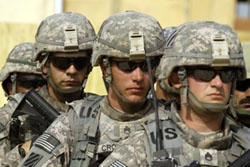Watching Ukraine Crisis Media Coverage May Trigger PTSD in Veterans
 Ukraine has 43 million people, and an estimated 27.5 million have smartphones, according to the statistics website “Statista.” Those phones, along with conventional video and photography, have graphically documented the invasion of their country by Russia.
Ukraine has 43 million people, and an estimated 27.5 million have smartphones, according to the statistics website “Statista.” Those phones, along with conventional video and photography, have graphically documented the invasion of their country by Russia.
Whether it’s people making Molotov cocktails in the streets, a Russian rocket streaking across the sky into an apartment building, or citizens huddled for safety in subway tunnels, the firsthand experiences of Ukrainians in wartime plays out every day, all day on TV screens, in newspapers and magazines, and on websites and social media channels.
That kind of media saturation has experts worried it could trigger Post Traumatic Stress Disorder (PTSD) symptoms in veterans.
“Because of the volume of information coming across – you can’t get on TV or social media without being exposed to it – and the graphic nature (of the images) because everyone has a cell phone, there is a high risk for the triggering of unpleasant experiences from wartime jobs,” said Dr. Glenn Markenson, MD, director of BU’s Center for Military Health.
PTSD can occur after experiencing or witnessing a life-threatening event, like combat. A person could repress memories of that event and avoid people, places and situations that might bring back that memory, possibly at a level where the person is reliving it.
People can feel sad or numb, fear, guilt or shame, and possibly become overly vigilant and suffer sleeplessness, worried the event could happen again.
Markenson, a retired colonel, has 25 years of active-duty experience in the Army, Army Reserves and Air National Guard. He was deployed as a physician during Desert Storm and Iraqi Freedom. He thinks veterans of recent conflicts in Afghanistan and Iraq may be especially vulnerable to cellphone video capturing house-to-house fighting as the Russian army moves into Ukrainian cities.
Markenson urges veterans, their families and caregivers to reach out to organizations like the local branch of the US Department of Veterans Affairs and the VA crisis hotline to get help.
Here are some helpful links:
- The US Department of Veterans Affairs National Center for PTSD
- The National Suicide Prevention Lifeline is a 24-hour hotline for anyone in emotional distress: 1-800-273-TALK (8255). There also is an online Lifeline Chat available from 5 p.m. to 1 a.m. EST, weekdays.
- The Veterans Crisis Line connects Veterans in crisis and their families and friends with VA responders through a 24/7 hotline: 1-800-273-TALK (8255), press 1. In addition there is a 24-hour online Confidential Veterans Chat and text message support available at 838255.
Read more about BUSM community member reaction to the crisis in Ukraine.